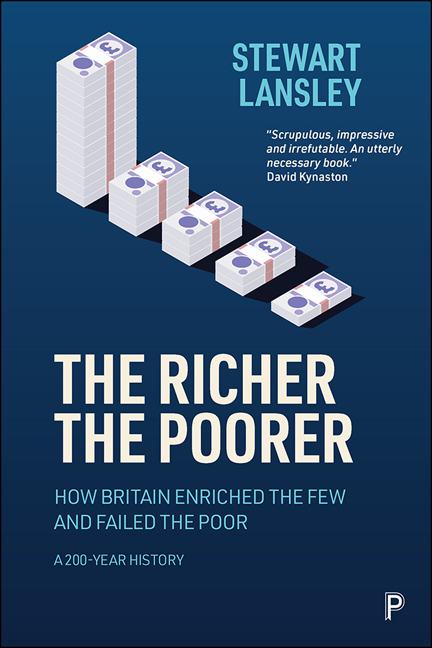Book contents
- Frontmatter
- Miscellaneous Frontmatter
- Dedication
- Epigraph
- Contents
- List of figures
- Preface and acknowledgements
- Introduction: Knighthoods for the rich, penalties for the poor
- PART I 1800–1939
- PART II 1940–59
- PART III 1960–79
- PART IV 1980–96
- PART V 1997–2010
- PART VI 2011–20
- Afterword: COVID-19 and ‘the polo season’
- Notes
- Index
10 - Poorer under Labour
Published online by Cambridge University Press: 13 May 2022
- Frontmatter
- Miscellaneous Frontmatter
- Dedication
- Epigraph
- Contents
- List of figures
- Preface and acknowledgements
- Introduction: Knighthoods for the rich, penalties for the poor
- PART I 1800–1939
- PART II 1940–59
- PART III 1960–79
- PART IV 1980–96
- PART V 1997–2010
- PART VI 2011–20
- Afterword: COVID-19 and ‘the polo season’
- Notes
- Index
Summary
When Harold Wilson unexpectedly called a general election for June 1970, CPAG seized the moment to raise the stakes. They prepared a private memorandum, A War on Poverty: Poor Families and the Election, highly critical of Labour's record. Before it was released, Richard Crossman, secretary of state for social services, agreed to meet Frank Field and Peter Townsend, now the group's chair. Crossman brought Brian Abel-Smith. He had joined Crossman as an adviser in 1968, forcing him to resign from CPAG's executive committee. The two friends –Abel-Smith and Townsend –were now on opposing sides.
The meeting was stormy. In Field's account: ‘Crossman banged the table, he shouted, he mocked. … The only action he didn't try was to swing from the chandelier.’ After the meeting, Field released the document to the press with the provocative headline ‘Poor get poorer under Labour’, thus launching a highly publicised turf war between the new lobbyists and the government. Field later explained that this attack was partly about exposing the myth that Labour ‘was on the side of the poor’. Not only did the row stoke considerable press interest, it was eagerly taken up by Edward Heath, the Conservative Party leader.
A few months earlier, Field had secured a meeting with the shadow Tory chancellor Iain Macleod. With none of the grandstanding displayed by Crossman, Macleod committed the next Conservative government to raising family allowances as the ‘most effective way of dealing with the growing problem of family poverty’. Field had not been expecting such a pledge, as the Conservatives had long been cool towards universal benefits. He used it to exert pressure during his meeting with Crossman. In response, Crossman asserted that Macleod's pledge would be reneged on if they were in government.
While CPAG's tactics established its independence from Labour, its more aggressive approach was controversial among supporters and added to a rift that had already been opening among the Titmice. Both Titmuss and Abel-Smith, for example, sided against Townsend over the high-level campaign against Labour's record on poverty and the accuracy of its report. Part of the explanation for the splits lay in the approach of these social policy pioneers.
- Type
- Chapter
- Information
- The Richer, the PoorerHow Britain Enriched the Few and Failed the Poor: A 200-Year History, pp. 90 - 97Publisher: Bristol University PressPrint publication year: 2021



